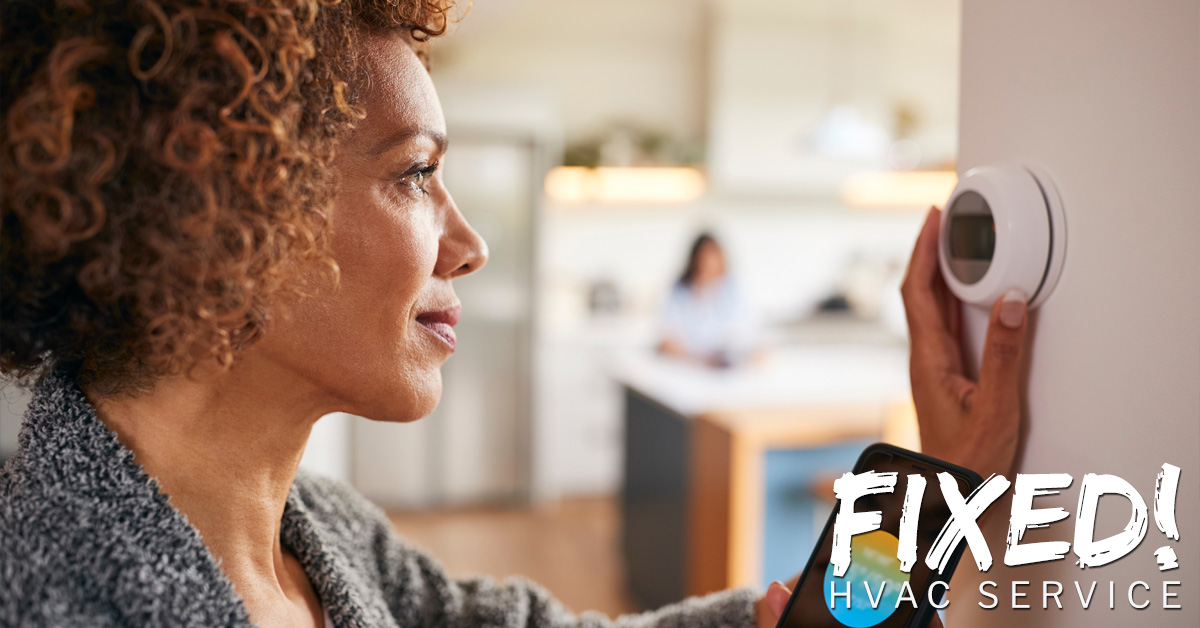
Have you ever noticed that extra setting on your heat pump labeled “Emergency Heat” or “Aux Heat”? Many homeowners in the Annapolis area wonder what it does and when they should use it. At FIXED! HVAC, we’re here to clear up any confusion and help you understand this critical feature. Let’s explore emergency heat, when to activate it, and how to maintain your system for optimal performance.
Understanding Heat Pump Emergency Heat
What Is Heat Pump Emergency Heat?
Your heat pump’s primary job is to transfer heat from the outside air into your home. However, your heat pump may need extra help when outdoor temperatures drop significantly. That’s where emergency heat (also called auxiliary heat) comes in. It typically consists of electric heating strips or another backup source that provides immediate warmth when the heat pump alone can’t keep up.
How Does It Work?
When you switch your system to emergency heat mode, the heat pump bypasses its usual outdoor operation. Instead, it relies on the backup heating source to produce heat. This process requires more energy than standard heat pump operation, which means higher electricity or fuel usage.
When Should You Use Emergency Heat?
Extremely Cold Weather
If outdoor temperatures drop well below freezing, your heat pump might struggle to extract enough heat from the air. In these conditions, activating the emergency heat can help maintain comfort until temperatures rise again.
Malfunctioning Heat Pump
If your heat pump isn’t running or has sustained damage—such as a broken compressor—you might need to use emergency heat to keep your home warm. However, this mode is only a temporary solution until professionals, like our team at FIXED! HVAC can inspect and repair your system.
System Defrost Cycles
During a defrost cycle, your heat pump briefly switches to cooling mode to melt ice on the outdoor coil. A backup heat source may kick in to prevent a drop in indoor temperature. This process usually happens automatically, so you don’t need to select emergency heat manually.
Potential Drawbacks of Using Emergency Heat
Higher Energy Costs
Emergency heat relies on electric resistance or another backup source, often consuming more energy than standard heat pump operation. Running it for extended periods can lead to a noticeable increase in utility bills.
Increased Wear and Tear
Constant use of emergency heat can put extra strain on your backup heating source. Over time, this can lead to more frequent repairs, or even premature replacement, if not monitored.
Less Efficient Heating
Heat pumps are designed to operate efficiently in most cold conditions. By switching to emergency heat unnecessarily, you lose the energy-saving benefits of your standard heat pump function.
How to Properly Use Emergency Heat
Know Your System’s Capabilities
Different heat pumps have varying limits on how low outdoor temperatures can go before efficiency declines. Check your owner’s manual or consult our team at FIXED! HVAC to learn more about your specific system’s performance range.
Monitor Outdoor Temperatures
Keep an eye on the forecast, especially during extreme cold snaps. If temperatures stay well below freezing for an extended period, your heat pump may need assistance. However, switch off emergency heat when outdoor temperatures rise to save on energy costs.
Seek Professional Advice
If you find yourself relying on emergency heat often, it could signal a deeper problem with your heat pump. A certified HVAC technician from FIXED! HVAC can pinpoint issues like low refrigerant, leaks, or faulty components that affect your system’s cold-weather performance.
Maintenance Tips for Optimal Performance
Regular Inspections
Schedule routine inspections at least once a year, and preferably twice. We’ll check your heat pump’s components, refrigerant levels, and defrost controls to ensure everything runs smoothly when temperatures dip.
Clean or Replace Filters
A dirty filter restricts airflow, making your heat pump work harder. Replace or clean filters monthly (or as recommended) for efficient operation and better indoor air quality.
Check for Leaks or Damage
Outdoor unit damage or refrigerant leaks can reduce your system’s ability to extract heat from the air. Contact FIXED! HVAC if you notice ice buildup, unusual noises, or performance drops.
Keep Outdoor Unit Clear
Remove debris, leaves, and snow from around your outdoor unit. Good airflow is essential for proper heat transfer and can help prevent frost or ice formation.
Experience the FIXED! HVAC Difference
At FIXED! HVAC, we believe in more than just fixing problems. We aim to empower homeowners in Annapolis with the knowledge they need to maintain efficient, reliable heating and cooling systems. When you choose us, you’re getting:
- Expert Technicians: Our team stays current with industry best practices and technologies.
- Honest Recommendations: We provide transparent advice tailored to your home and budget.
- Community Commitment: As a local, family-owned business, we’re proud to serve our neighbors with integrity.
- Value-Driven Services: We focus on delivering solutions that save you money while enhancing comfort.
We understand that every home is unique, and so are your heating needs. Whether you need a quick repair, a detailed inspection, or guidance on using emergency heat, we’re ready to help.
Need Help with Emergency Heat or Your Heat Pump?
Thank you for considering FIXED! HVAC for your heating and cooling needs. With the right approach, you’ll know exactly when to activate emergency heat and how to keep your system running at peak efficiency. If you have any questions or concerns about your heat pump, reach out today. We look forward to serving you and helping you stay comfortable—no matter how low the temperatures drop.

